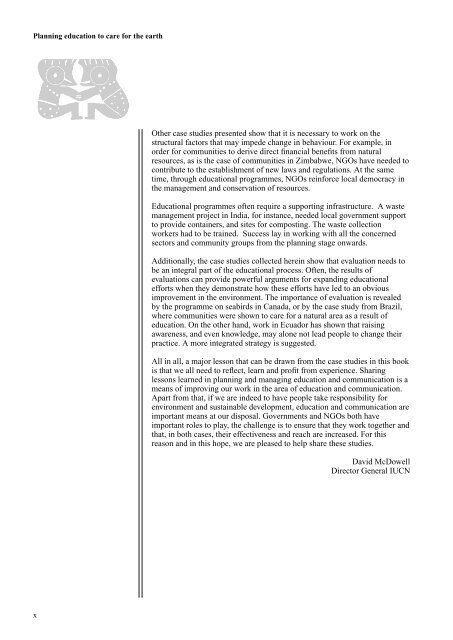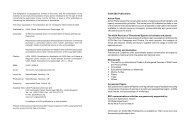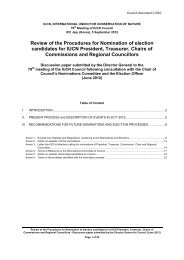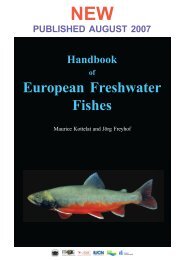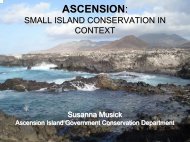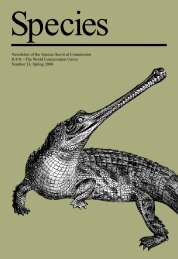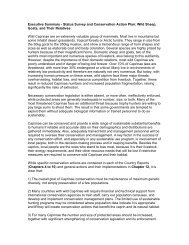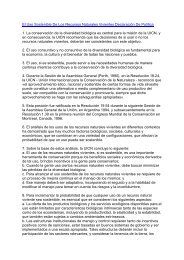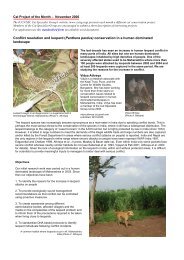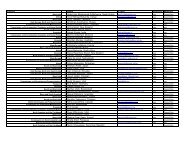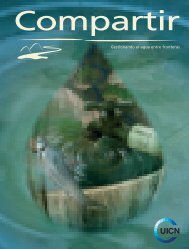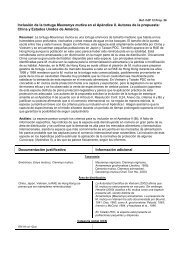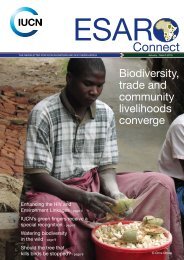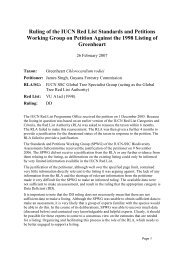Planning education to care for the earth - IUCN Knowledge Network
Planning education to care for the earth - IUCN Knowledge Network
Planning education to care for the earth - IUCN Knowledge Network
Create successful ePaper yourself
Turn your PDF publications into a flip-book with our unique Google optimized e-Paper software.
<strong>Planning</strong> <strong>education</strong> <strong>to</strong> <strong>care</strong> <strong>for</strong> <strong>the</strong> <strong>earth</strong>O<strong>the</strong>r case studies presented show that it is necessary <strong>to</strong> work on <strong>the</strong>structural fac<strong>to</strong>rs that may impede change in behaviour. For example, inorder <strong>for</strong> communities <strong>to</strong> derive direct financial benefits from naturalresources, as is <strong>the</strong> case of communities in Zimbabwe, NGOs have needed <strong>to</strong>contribute <strong>to</strong> <strong>the</strong> establishment of new laws and regulations. At <strong>the</strong> sametime, through <strong>education</strong>al programmes, NGOs rein<strong>for</strong>ce local democracy in<strong>the</strong> management and conservation of resources.Educational programmes often require a supporting infrastructure. A wastemanagement project in India, <strong>for</strong> instance, needed local government support<strong>to</strong> provide containers, and sites <strong>for</strong> composting. The waste collectionworkers had <strong>to</strong> be trained. Success lay in working with all <strong>the</strong> concernedsec<strong>to</strong>rs and community groups from <strong>the</strong> planning stage onwards.Additionally, <strong>the</strong> case studies collected herein show that evaluation needs <strong>to</strong>be an integral part of <strong>the</strong> <strong>education</strong>al process. Often, <strong>the</strong> results ofevaluations can provide powerful arguments <strong>for</strong> expanding <strong>education</strong>alef<strong>for</strong>ts when <strong>the</strong>y demonstrate how <strong>the</strong>se ef<strong>for</strong>ts have led <strong>to</strong> an obviousimprovement in <strong>the</strong> environment. The importance of evaluation is revealedby <strong>the</strong> programme on seabirds in Canada, or by <strong>the</strong> case study from Brazil,where communities were shown <strong>to</strong> <strong>care</strong> <strong>for</strong> a natural area as a result of<strong>education</strong>. On <strong>the</strong> o<strong>the</strong>r hand, work in Ecuador has shown that raisingawareness, and even knowledge, may alone not lead people <strong>to</strong> change <strong>the</strong>irpractice. A more integrated strategy is suggested.All in all, a major lesson that can be drawn from <strong>the</strong> case studies in this bookis that we all need <strong>to</strong> reflect, learn and profit from experience. Sharinglessons learned in planning and managing <strong>education</strong> and communication is ameans of improving our work in <strong>the</strong> area of <strong>education</strong> and communication.Apart from that, if we are indeed <strong>to</strong> have people take responsibility <strong>for</strong>environment and sustainable development, <strong>education</strong> and communication areimportant means at our disposal. Governments and NGOs both haveimportant roles <strong>to</strong> play, <strong>the</strong> challenge is <strong>to</strong> ensure that <strong>the</strong>y work <strong>to</strong>ge<strong>the</strong>r andthat, in both cases, <strong>the</strong>ir effectiveness and reach are increased. For thisreason and in this hope, we are pleased <strong>to</strong> help share <strong>the</strong>se studies.David McDowellDirec<strong>to</strong>r General <strong>IUCN</strong>x


